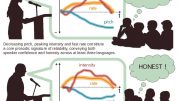
The study found that Americans use the word “right” to signify their existing knowledge or awareness about a specific subject, while British English speakers use it to convey that the information they are receiving is informative and significant to the ongoing conversation.
A recent study conducted by Rutgers University reveals that British and American English speakers use the word “right” differently in their daily conversations.
Are the British smarter and more knowledgeable than Americans? A recent study by Rutgers researchers indicates that Americans seem to believe so.
A new study published in Journal of Pragmatics analyzes how American and British English speakers use “right” to respond in conversation.
They found Americans use the word “right” to indicate they are already knowledgeable or informed about a given subject or situation. By contrast, British English speakers use “right” to indicate that what they hear is informative, and relevant to the ongoing interaction.
In this case, Americans hear British speakers claiming to already know what they are being told – even though they don’t.
Because the British use “right” in conversations more than Americans and because of this difference in meaning between a British and an American “right,” its use might signal to Americans that the British are “smarter,” the researchers say.
Additionally, the British accent contributes to the American stereotype that British people are smarter because it sounds more sophisticated than their own.
In developing their analysis, the scientists drew on a collection of approximately 125 segments of everyday conversation and work discussions, including 70 segments in British English and 55 segments in American English.
The study “sheds light on how minute linguistic differences, which we might not even recognize, impact our interactions with others and color our perceptions of their expertise and knowledge,” said coauthor Galina Bolden, professor of communication at Rutgers.
The Rutgers researchers initially became interested in conducting this research when they overheard a “puzzling misunderstanding” between an American and a person from the UK during a conversation.
The findings illuminate different ways speakers can convey their epistemic stances – i.e., how they lay claim to different levels of knowledge. Additionally, the findings demonstrate the payoffs of using the methods of conversation analysis for understanding intercultural communication processes and learning about different varieties of English and other languages.
According to the study, further research could “examine the entire landscape of these kinds of response particles (in particular positions) in the U.S. vs. U.K. data with an eye towards the kinds of stances they convey vis-a-vis prior talk (i.e. what exactly they do internationally). Such analysis might enable researchers to explore whether the differences between the two language varieties are primarily linguistic or cultural.”
Reference: “The distinctive uses of right in British and American English interaction” by Galina B. Bolden, Alexa Hepburn and Jenny Mandelbaum, 16 January 2023, Journal of Pragmatics.
DOI: 10.1016/j.pragma.2022.12.017









Right…to me, when said slowly, the word connotes a cautious skepticism, an unconvinced invitation to continue explaining. When said quickly, it’s more of an interjection like ‘fine’, an impatient resignation to the reality of a situation and sudden committment to do the only feasible thing left. Change the pitch, and it’s an impatient confirmation, as if to say “Why don’t others understand?”.
In an American context, it seems more limited to ‘yes’, an “uh huh”, an affirmative confirmation. The accent may seem smarter in this instance because there’s more going on in pitch/tempo/intonation, more complex potential meanings.
“Two nations divided by a common language.”
Commonly attributed to George Bernard Shaw or Winston Churchill. I’m sure that Churchill was familiar with the writings of Shaw, however.